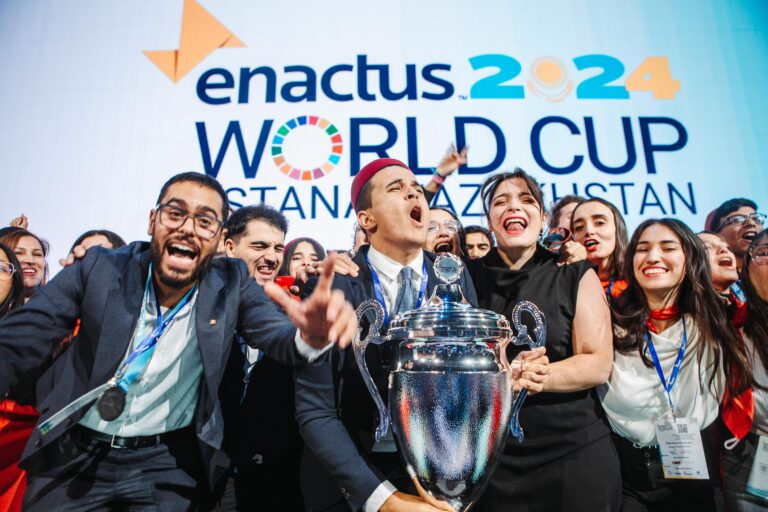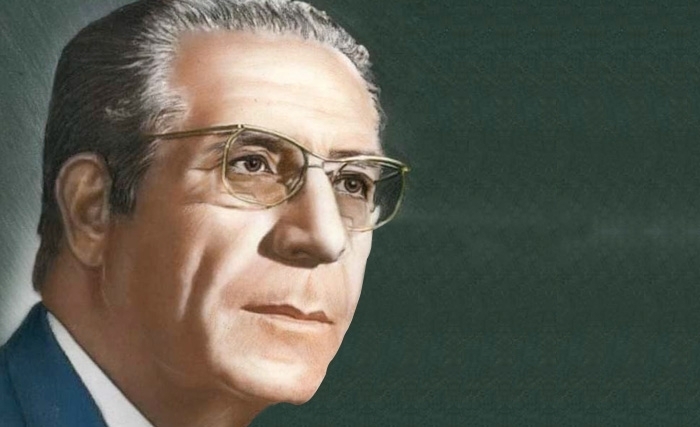University students from Tunis Business School in El Mourouj, Tunisia are the 2024 Enactus World Cup Champions with their social enterprise BOVITA. The team won the competition from a field of 29 challengers comprised of National Champions from the Enactus country network around the world.
The Enactus team from Mohammad V University in Morocco clinched second place at Kongress-Tsentr in Astana. Rounding out the Final Four teams were Karlsruhe Institute of Technology of Germany and Konkuk University of Korea.
The Enactus World Cup 2024 brought together over 700 of the world’s brightest young social entrepreneurs from over 30 countries with a joint mission to solve critical global challenges. At Enactus World Cup, students compete, collaborate, make intercultural connections, and are inspired to further develop skills that drive impact through social entrepreneurship.
BOVITA provides a range of 100% natural phytotherapy-based products designed to replace antibiotics and chemical treatments in the prevention and treatment of Bovine Mastitis. Their product line includes an extramammary cream for mild cases, an oil-based gel for prevention, and a natural intramammary injection for severe cases, all aimed at effectively healing infected areas, reducing inflammation, and eliminating bacteria.
The event was graced by several notable attendees, including ecologist and philanthropist, Aselle Tasmagambetova; Director of UN Global Compact Kazakhstan, Dinara Seijaparova; Chairman of the Board of Kazakh Tourism, Kairat Sadvakasson; and Minister of Science and Higher Education of the Republic of Kazakhstan, Sayasat Nurbek, who delivered a special welcome message on behalf of the President of The Republic of Kazakhstan, Kassym-Jomart Tokayev.
In his message, President Tokayev emphasized the importance of the event, stating:
“In Kazakhstan we have created the very best environment for young people to access quality education and engage in entrepreneurship. Hosting this prestigious event in our country and within the commonwealth of independent states is a testament to this progress. The Enactus World Cup 2024 will inspire the growth of youth entrepreneurship and help cultivate the next generation of business leaders.”
As Enactus Global navigates a period of transition, the organization’s commitment to inspiring and supporting the next generation of entrepreneurial leaders continues to grow. This dedication is evident in the success of the Enactus World Cup in Astana and the announcement that Bangkok, Thailand will host the 2025 Enactus World Cup. Furthermore, Enactus Colombia has officially joined the network, and Enactus Thailand has rejoined, expanding the Enactus presence to 35 countries worldwide.
Supporting this vital mission and global expansion, Resolution Project has committed over $2 million to Enactus Global, ensuring the continuation of its nearly 50-year legacy of educating and equipping young social entrepreneurs.
“The Enactus World Cup truly showcases the incredible potential of youth innovation,” said Lauren Horn, Interim CEO of Enactus Global & United States. “Over the past few days, we’ve seen firsthand how the innovation and passion of these young entrepreneurs can create real change. The spirit and impact of Enactus remain as strong as ever, thanks to the dedication of our students, partners, and supporters worldwide. With Resolution Project’s commitment and our expanding global network, we can ensure that the Enactus World Cup will continue to be a platform where young changemakers collaborate, innovate, and turn their ideas into real-world solutions that shape our future.
The event would not have been possible without the host country Enactus Kazakhstan, and support from sponsors and partners such as Kazakh Tourism, The Sunshine Charitable Foundation, BIC, John Dobson Foundation, Harmony Gold, Jeanne Sauvé Foundation, and more. “I’m really happy to see everyone here in my beautiful country,” said Albina Yerzhanova, President & CEO of Enactus Kazakhstan. “Hosting the Enactus World Cup in Astana shows how much Kazakhstan values innovation and young entrepreneurs. It’s exciting to bring together these brilliant students and showcase their ideas for making the world better.”
Enactus Global and Resolution Project’s combined impact includes engaging over 40,000 young social entrepreneurs annually, with a presence in nearly 100 countries. These young leaders have cumulatively impacted almost 20 million lives.
source/content: enactus.org (headline edited)
_________

___________
TUNISIA
